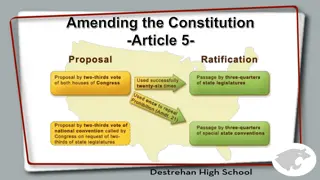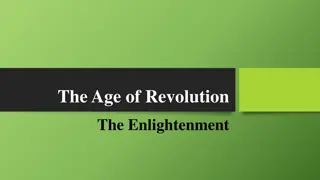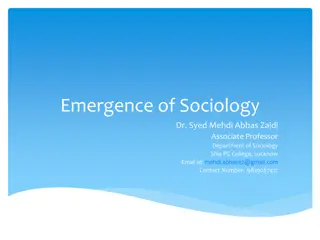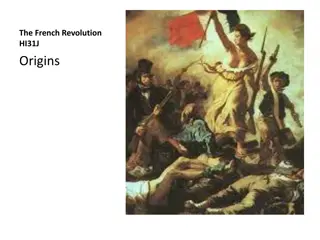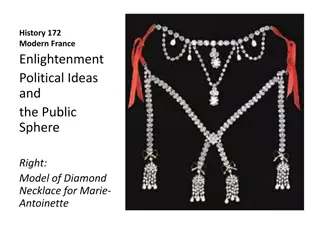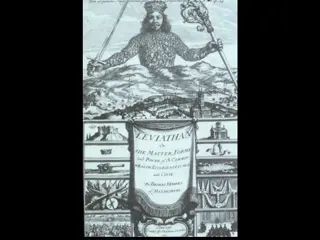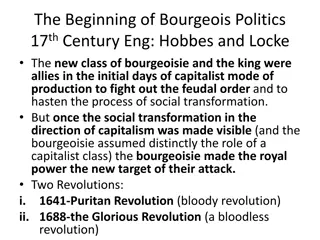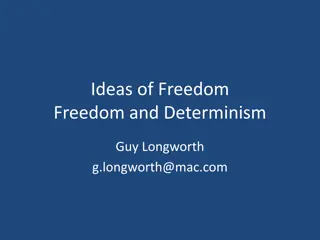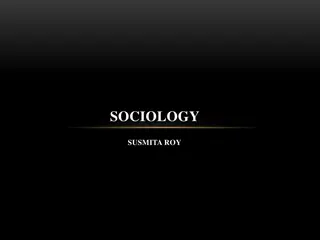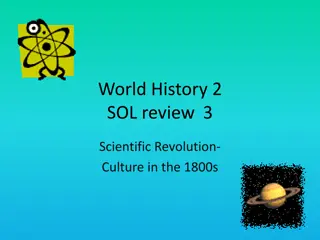Compare & Contrast
Similarities and differences in the ideologies of Thomas Hobbes and John Locke, focusing on their views on the state of nature, social contract, and forms of government.
4 views • 8 slides
Origins of Government Power in the United States
The U.S. government derives its power from the consent of the governed, reflecting principles of popular sovereignty, general will, and majority rule. Philosophers like Hobbes, Locke, and Rousseau have influenced the concept of government's legitimacy through the consent of the people. The evolution
0 views • 13 slides
Enlightenment Thinkers and Their Ideals
The Age of Revolution was marked by influential Enlightenment thinkers such as Thomas Hobbes, John Locke, Montesquieu, and Jean-Jacques Rousseau. These philosophers explored human nature, government, and society, shaping modern political thought. Hobbes emphasized a pessimistic view, advocating for
2 views • 9 slides
The Emergence of Sociology: A Historical Overview
Sociology, derived from Latin and Greek roots, has evolved over centuries through various stages, influenced by social, economic, and political factors. Key thinkers like Plato, Aristotle, Hobbes, Locke, Rousseau, Montesquieu, Comte, Durkheim, and Marx have shaped the discipline. The Industrial Revo
1 views • 23 slides
Enlightenment Philosophers and Their Influence on the French Revolution
The French Revolution was influenced by Enlightenment philosophers like Thomas Hobbes, Rousseau, Voltaire, and Montesquieu. Their ideas on social contracts, collective sovereignty, enlightened absolutism, and the need for checks and balances challenged the traditional Ancien Régime's feudalism, pri
0 views • 26 slides
Enlightenment Political Ideas in Modern France
The Enlightenment era in Modern France brought forth significant political ideas and discussions, including Thomas Hobbes' concept of social contract and Rousseau's emphasis on collective sovereignty. Montesquieu advocated for checks-and-balances in government, while Voltaire promoted enlightened ab
0 views • 21 slides
Understanding Thomas Hobbes' Leviathan: State of Nature, Natural Laws, and Commonwealth
Thomas Hobbes explores the state of nature, natural laws, and the formation of the commonwealth in his work Leviathan. He discusses the equality of men, causes of conflict in the state of nature, and the transition out of this chaotic state towards civil society under a monarchy. According to Hobbes
0 views • 15 slides
Insights into the Enlightenment Thinkers: Philosophers of Change
The Enlightenment era marked a shift towards reason and enlightenment, with thinkers like Locke, Hobbes, Montesquieu, Rousseau, and Voltaire advocating for progress, natural law, and individual rights. Each philosopher contributed unique ideas to reshape societal structures, challenging traditional
0 views • 18 slides
The Evolution of Bourgeois Politics in 17th Century England: Insights from Hobbes and Locke
The emergence of bourgeois politics in 17th century England marked a significant shift in power dynamics as capitalism began to take hold. The bourgeoisie initially allied with the monarchy to overthrow the feudal order but later turned against the royal power. The Puritan Revolution and the Gloriou
0 views • 20 slides
Understanding Long-Term Trends in Violence and Armed Conflicts
Explore the profound insights into the nature of violence and armed conflicts through renowned works like 'Leviathan' by Thomas Hobbes. Delve into the causes of quarrels among men, the consequences of living without a common power, and the anarchical nature of international relations as illustrated
0 views • 29 slides
Exploring the Interplay of Freedom and Determinism: Hobbes's Regress Argument
Delve into the philosophical debate between freedom and determinism through the lens of Hobbes's Regress Argument, examining the challenges posed by the relationship between freedom of action and freedom of will in the context of human decision-making.
0 views • 21 slides
Understanding Traffic Education: A Lesson on Traffic Jams and Solutions
Join Mr. Ariful Islam in his English class for Alim 1st year students as he introduces the topic of Traffic Education. Through warm-up activities and reading Michael Hobbes' article on traffic challenges in Dhaka, Bangladesh, students explore the causes of traffic jams and envision solutions to impr
1 views • 23 slides
Understanding Social Class in Sociology
Social class, also known as class, refers to a group of individuals in a society who share similar socioeconomic status. The concept of class plays a crucial role in social theory, influencing social mobility and census data. From early theories by political philosophers like Hobbes to Marx's influe
0 views • 17 slides
The Enlightenment and Absolutism: Key Concepts and Figures
The period saw significant developments, including the Scientific Revolution emphasizing reason and systematic observation, leading to the expansion of scientific knowledge. Absolutism showcased monarchs' control, like Peter the Great's westernization of Russia and Louis XIV's Palace of Versailles.
0 views • 22 slides

